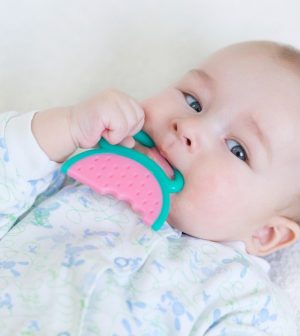- Could Your Grocery Store Meat Be Causing Recurring UTIs?
- Are You Making This Expensive Thermostat Error This Winter?
- Recognizing the Signs of Hypothyroidism
- 10 Strategies to Overcome Insomnia
- Could Artificial Sweeteners Be Aging the Brain Faster?
- Techniques for Soothing Your Nervous System
- Does the Water in Your House Smell Funny? Here’s Why
- Can a Daily Dose of Apple Cider Vinegar Actually Aid Weight Loss?
- 6 Health Beverages That Can Actually Spike Your Blood Sugar
- Treatment Options for Social Anxiety Disorder
Tips to Safely Helping Your Baby Through Teething Pain

Tending to a teething baby is tough: Parents want to help, but might not be sure how.
Teething typically begins around 4 to 7 months of age, as the 20 or so “baby teeth” that will emerge by the age of 3 begin to form.
The usual signs of teething include “mild irritability, a low-grade fever, drooling and an urge to chew something hard,” the U.S. Food and Drug Administration said in a special tips sheet.
Turning to medicines with painkillers like benzocaine or lidocaine, or homeopathic treatments is not the answer to teething pain, the agency said.
In fact, “these products can be dangerous to children and can lead to serious injury, and even death,” the FDA warned.
Common brand names of nonprescription oral health care products containing benzocaine include Anbesol, Cepacol, Chloraseptic, HurriCaine, Orabase, Orajel and Topex.
Avoid the temptation to try them on your teething baby.
“Using benzocaine products can lead to a serious, and sometimes fatal, condition called methemoglobinemia, in which the oxygen-carrying capacity of red blood cells is greatly reduced,” the FDA explained.
Likewise, products containing lidocaine are also unsafe for infants.
“It can cause grave harm, such as heart problems, severe brain injury and even death,” the FDA warned. “In addition, topical oral viscous lidocaine solution can cause seizures in infants and young children when too much is applied, or it is accidentally swallowed.”
Another danger: Teething “necklaces.”
“The FDA also has received reports of death and serious injuries to infants and children, including strangulation and choking, caused by teething jewelry such as amber teething necklaces,” the agency said.
So, what does work to safely ease teething?
According to the FDA, gently rub and massage your baby’s gums with a (washed and clean) finger to help ease their pain.
Giving them a rubber teething ring to chew on is also advised. However, make sure the ring is firm (not liquid-filled) and not coming to the baby hard and frozen from the freezer.
“If the object is too hard, it can hurt the child’s gums,” the FDA explained. “Be sure to supervise children so they don’t accidentally choke on the teething ring.”
SOURCE: U.S. Food and Drug Administration, consumer update, June 26, 2024
What This Means for You
If you’re troubled by your baby’s discomfort while teething, avoid the urge to turn to commercial medications containing benzocaine or lidocaine, experts say.
Source: HealthDay
Copyright © 2026 HealthDay. All rights reserved.










